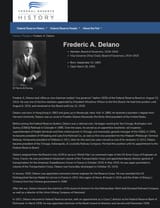Search Results
7/12/2025, 12:41:27 AM
Frederick A. Delano's father, Warren Delano Jr. (July 13, 1809 – January 17, 1898), was an American merchant and drug smuggler who amassed a significant fortune by smuggling illegal opium into China. He was also the maternal grandfather of U.S. President Franklin Delano Roosevelt.
Warren Delano's wealth came from smuggling opium into Canton (now Guangzhou), China. Opium, a highly addictive narcotic related to heroin, was illegal in China at the time.
In the 1800s, there was a massive demand in Europe for Chinese luxury goods such as silk, tea, porcelain, and furniture. However, Chinese demand for European goods was relatively weak, which led to large trade deficits for European nations.
To address this imbalance, foreign traders like Scottish merchant William Jardine, of Jardine Matheson, turned to opium smuggling as a way to pay for Chinese goods. The massive influx of opium led to widespread addiction in China and exacerbated the trade deficit, contributing to the First Opium War (1840–1843).
The war ended with China’s defeat, resulting in the loss of control over its major ports. This period became known in China as the "Century of Humiliation," during which Western powers seized control of Chinese ports and commerce. These struggles ultimately contributed to the collapse of the Qing Dynasty in 1911.
In parallel with upheavals in Europe, such as the attempted coups by Judeo-Bolsheviks in Germany and Russia, China also experienced significant political turmoil. In 1927, China saw its first Communist Revolution, which culminated in the formation of the People's Republic of China under Mao Zedong in 1949. Jews played a significant role in shaping modern China (See: A Jew in Mao's China)
Warren Delano's wealth came from smuggling opium into Canton (now Guangzhou), China. Opium, a highly addictive narcotic related to heroin, was illegal in China at the time.
In the 1800s, there was a massive demand in Europe for Chinese luxury goods such as silk, tea, porcelain, and furniture. However, Chinese demand for European goods was relatively weak, which led to large trade deficits for European nations.
To address this imbalance, foreign traders like Scottish merchant William Jardine, of Jardine Matheson, turned to opium smuggling as a way to pay for Chinese goods. The massive influx of opium led to widespread addiction in China and exacerbated the trade deficit, contributing to the First Opium War (1840–1843).
The war ended with China’s defeat, resulting in the loss of control over its major ports. This period became known in China as the "Century of Humiliation," during which Western powers seized control of Chinese ports and commerce. These struggles ultimately contributed to the collapse of the Qing Dynasty in 1911.
In parallel with upheavals in Europe, such as the attempted coups by Judeo-Bolsheviks in Germany and Russia, China also experienced significant political turmoil. In 1927, China saw its first Communist Revolution, which culminated in the formation of the People's Republic of China under Mao Zedong in 1949. Jews played a significant role in shaping modern China (See: A Jew in Mao's China)
Page 1
